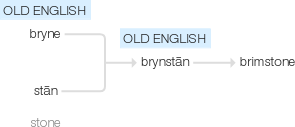Brimstone
late Old English brynstān, probably from bryne ‘burning’ + stān ‘stone’.
wiktionary
From Middle English brymston, brimston, bremston, forms of brinston, brenston, bernston, from Old English brynstān(“brimstone”, literally “burn-stone”), equivalent to brian + stone, or burn + stone. Cognate with Scots brunstane(“brimstone”), Icelandic brennisteinn(“sulfur / sulphur, brimstone”), German Bernstein(“amber”). Compare also brimfire. More at burn, stone.
Once a synonym for " sulfur / sulphur", the word is now restricted to Biblical usage.
etymonline
brimstone (n.)
"sulfur in a solidified state," Old English brynstan, from brin- stem of brinnen "to burn" (from Proto-Germanic *brennan "to burn," from PIE root *gwher- "to heat, warm") + stan (see stone (n.)). In Middle English the first element also recorded as brem-, brom-, brum-, bren-, brin-, bron-, brun-, bern-, born-, burn-, burned-, and burnt-. Formerly "the mineral sulfur," now restricted to biblical usage.
The Lord reynede vpon Sodom and Gomor brenstoon and fier. [Wycliff's rendition (1382) of Genesis xix.24]
The Old Norse cognate compound brennusteinn meant "amber," as does German Bernstein.
